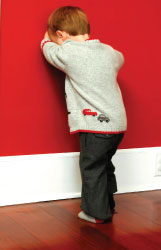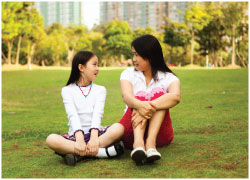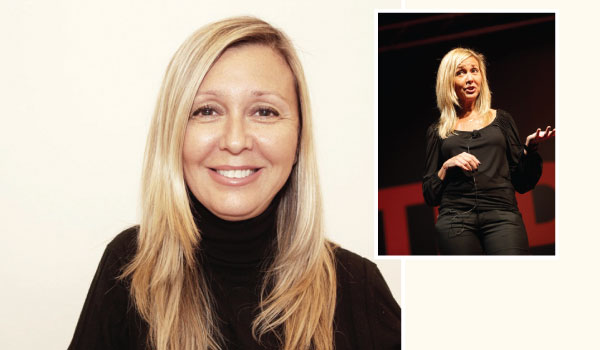To allow children to be empowered and to ensure a designed relationship that is balanced between parents and children might seem too progressive for some, but it works.
I took some time out recently to re-evaluate and re-confirm my own parenting beliefs and values by attending a Parentology course in Dubai. I was blown away by the energy and motivation of the coaches and the other parents in the room.

I was also challenged and motivated to try out something that I feel is very important with even more conviction. Empowering children is definitely the way forward for guardians and anyone who is in a relationship with children. I want to share with you some reflections of a different type of ‘time out’ from Gonan Premfors, co-founder Gozamm (the home of the Parentology philosophies).
In her voice
I rarely watch television, but I must admit that recently I have been fascinated by the show called Supernanny. It’s hard for me to see all the featured families on the TV show as they struggle through various issues. It would be nice, but unfortunately our course is not aimed at fixing the various issues that families have. Our approach and model will most certainly help a great deal, but it will not fix a family’s problems immediately.
One thing that I see a lot in the show is that kids are regularly sent to time out or naughty corner. I know this is a discipline strategy that is also used by a lot of families (and teachers). It really hurts me when I see kids who have been sent for time outs.
Sure, it works to control undesired behaviour in the short term. Is it really doing any good to those children? Discipline out of fear, threats and guilt are not really something we should put a child through.
Here is the dilemma I have with ‘time out’ or ‘the naughty corner’. You use it because you want children to reflect about having made a bad choice. If you have not given the skill of reflection to a child, all he or she will be thinking is “I am bad, I am wrong and I am guilty”. Therefore they will make decisions from places of fear and guilt.
How can you raise powerful children from a feeling of guilt or fear? That is the big question.
An anecdote
 Before I go any further I want to share a story from this summer that involves my daughter Amelia. While in our summerhouse in Turkey, we had some family members coming over to stay with us.
Before I go any further I want to share a story from this summer that involves my daughter Amelia. While in our summerhouse in Turkey, we had some family members coming over to stay with us.
When we told Amelia that they were coming she was initially very happy, but her upbeat mood rapidly changed into a sulk. “But they smoke,” she said disapprovingly.
We told her that our house is a non-smoking zone and that they will not smoke inside the house. She seemed okay with our words. However, a few hours later she came to us with a piece of paper in her hand.
It was a very tidy document, written very nicely with marker pens and at the bottom of the page she had clearly written the names of the three family members and left space above for dates and signatures. I was stunned. She had prepared a detailed ‘contract’ for our guests to sign.
In the contract, she laid down the rules of their stay, which included no smoking inside the house nor in the garden (to respect our trees and flowers) and no smoking in the restaurants at our table even if it is a smoking table (to respect her).
All our guests read and signed the contract without hesitation. During their stay, it was amazing to watch these adults get up and leave the table or walk out on the street outside to honour the terms of Amelia’s contract.
I was amazed for several reasons. Firstly, it was the whole idea of a contract. We talk about rules and values at home, but we have never talked about using contracts when we design relationships.
Secondly, she decided to take charge of a circumstance in a playful way that allowed her to claim her power as an 11-year-old. As a direct result, she was seen, heard, respected and followed.
I share this with you because one of the biggest concepts of our parenting model is power and where it lies in the relationship. The more we keep the balance equal, the more she decides to take charge of her circumstances. This reassures me for her future and for her interactions in school.
Of course I sometimes end up overpowering her and flipping it the other way too and I give too much power away. When I do, the question is “how do I recover from that and what are the consequences if I don’t”.
(PS I received permission to share the story from my daughter.)
 My conclusion
My conclusion
For me, the course has had an impact. It re-confirmed that it’s ok for children to be bored (and just be), to fail, refuse conformity, to question and to ask for what they want and need.
Our children are not our clones, who we live our life through. They are powerful, albeit ‘little’ people in their own right. They deserve respect and can teach us so much as well.
Listen so you can understand your children. Share and encourage them to share their thoughts with you. Let them make decisions knowing the consequences. Design family rules that are co-created.
There’s so much more that can be learnt and explored regarding strengthening relationships. In doing this you are modelling bravery and, of course, your children will model it too. Give it a go and share your learning. It’s worked for me. The school run is calmer, the children are working on managing ‘their’ time and they have stepped up to the responsibility!
Gonan Premfors is the co-founder of Gozamm, the California-based company and movement behind the Parentology and Trust philosophies. The former financial advisor turned her back on the financial world in 2004 in order to build her relationship with her daughter. That journey saw her become the Middle East’s first professionally certified coach, she established the world-renowned Coaches Training Institute in Dubai and she created her own coach-based relationship philosophies. Today, Gozamm offers cutting-edge transformative workshops in five continents. The next Middle East workshop is Parentology from November 4 to 6, and Trust from November 18 to 20, both in Dubai.
Visit www.gozamm.com





































